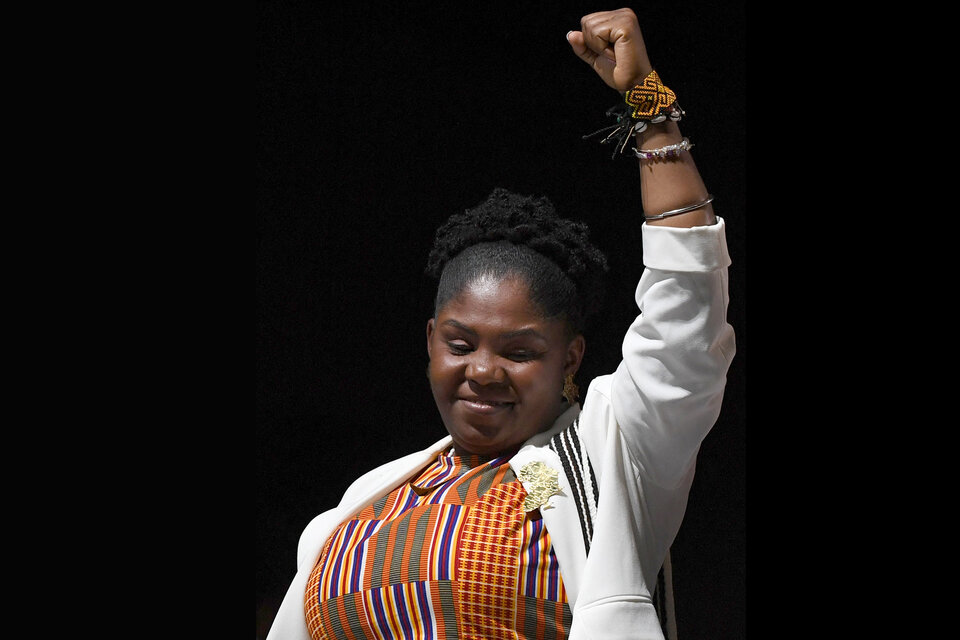 The first fact about Colombia’s vice-president-elect, Francia Márquez, is her African descent. However, her origins are more relevant than what is evident at first glance. It was her history as a human rights activist and lawyer for social causes that led her to the prominent role she has today.
The first fact about Colombia’s vice-president-elect, Francia Márquez, is her African descent. However, her origins are more relevant than what is evident at first glance. It was her history as a human rights activist and lawyer for social causes that led her to the prominent role she has today.
Francia was born in 1981, in the village of Yolombó, located in Suárez, a town in the department of Cauca in southwestern Colombia where mining exploitation is the main factor of economic dependence and social struggles.
A history of militancy against extractivism
Her family depended on the industry. While her mother was a midwife in the small local health system, her laborer father worked in the mines and she herself had her first job as an artisanal gold miner. She later became a domestic worker and at the age of 16 she had the first of her two children.
As a teenage mother, she studied at the University of Santiago de Cali and graduated as a lawyer, while the environmental damage and forced displacement of hundreds of inhabitants in her hometown grew. However, these two were the triggers for her social and political activism.
Not only did she oppose the indiscriminate extractivism caused by the granting of mining titles to companies everywhere, but she also made her own the defense of the environment and human rights also affected by that industry.
Her activism began in 2009, during claims to save the Ovejas River from the contamination caused by mining, and since then she has been awarded several recognitions. One of the milestones of her long social struggle was receiving the Goldman Environmental Prize, considered the environmental Nobel Prize.
In 2014 she participated in the interethnic and intercultural roundtable that demanded the Colombian national government to stop illegal mining and the granting of mining titles without prior consultation in the territories of native communities. She denounced “corruption” and became a target of paramilitary groups harassing villagers.
Victim for fighting back
That year she was forcibly displaced from her home and later organized, together with some 70 Afro-descendant women, “The March of the Turbans”, an event that was also known as ” Black Women for the Care of Life and Ancestral Territories”. With them she left on November 17 from Suarez to Bogota. She traveled 600 kilometers to demand a solution to the problem of illegal mining.
She also traveled to Cuba during the peace talks between the government of Juan Manuel Santos with FARC leaders. And in 2015 she participated in a community assembly in northern Cauca to demand that the Colombian state guarantee protection for leaders who are continually threatened.
However, her ethnic and peasant militancy earned her several new threats, and even an attempt on her life by paramilitaries; it was in 2019, during her legal representation on the Community Council of La Toma de Suárez, a position she has held since 2016.
A symbol of marginalized communities
Of course, her condition as a woman and her Afro-descent were other fronts in which she had to battle. Moreover, they were topics for which the most conservative right-wing sectors questioned her competence for the position she won as Gustavo Pertro’s running mate.
Dressed in colorful costumes typical of her region and with her facility as an orator, Marquez captivated the electorate, especially the youth. She became a political phenomenon and a symbol of the communities traditionally marginalized in politics, and opened a space for the hope of representation.
Another of the common places where she was attacked during the electoral campaign was for her lack of experience in the partisan political arena.
“Many say that I have no experience to accompany Gustavo Petro to govern this country and I ask myself why their experience did not allow us to live in dignity?” she responded in one of her speeches.
“Why has their experience kept us subjected to violence for so many years, which generated more than eight million victims? Why did their experience not allow all Colombians to live in peace?” she added.
To whom she dedicated her victory
During her first speech as vice-president-elect, Francia dedicated a special paragraph to social and minority struggles.
“We women are going to eradicate patriarchy from our country, we are going for the rights of the LGBTIQ+ diverse community, we are going for the rights of our mother earth, of the big house. To take care of our big house, to take care of biodiversity, and let’s go together to eradicate structural racism,” she said.
Her message, she added, was for the “social leaders who sadly were murdered in this country, for the youth who have been murdered and disappeared, for the women who have been raped and disappeared. To all of them who I know are accompanying us from somewhere in this historic moment for Colombia,” she concluded.
Interview with Pacto Histórico’s Vice Presidential Candidate
Gustavo Petro, President-Elect of Colombia: “The Government of Hope Has Arrived”